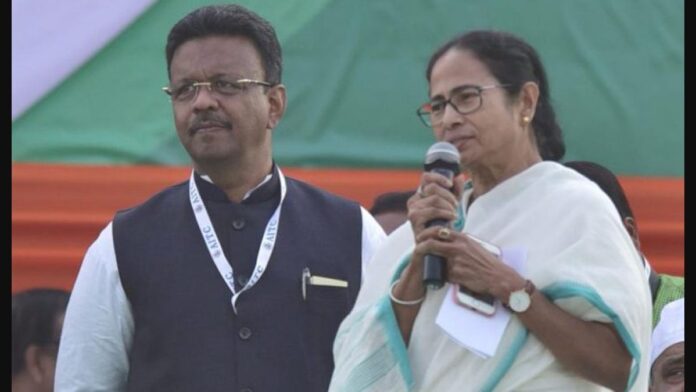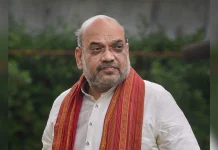Apart from the induction of new faces in her council of ministers, the most significant aspect of Bengal Chief Minister Mamata Banerjee’s cabinet reshuffle and expansion was senior cabinet minister Firhad Hakim losing some important departments.
By Jaideep Mazumdar
Hakim, considered to be a close aide and a long-time associate of Mamata Banerjee, is the senior-most Muslim representative in Banerjee’s ministry. And he held crucial departments like urban development and municipal affairs, housing and transport.
The Chief Minister took away two important portfolios — housing and transport — from him. This has resulted in Hakim’s fall in status in the council of ministers. Simultaneously, a few other cabinet ministers have been given additional departments and that has led to Hakim being ranked considerably lower in the the order of importance in the cabinet.
For instance, Aroop Biswas, another close aide of Mamata Banerjee, was given the housing department in addition to the power, youth services and sports departments that he was already in charge of. The transport department has been given to the newly-inducted Snehashish Chakraborty.
Hakim is now ranked lower (in the cabinet) than not only Biswas, but also Moloy Ghatak (labour, law, judicial and public works), Shashi Panja (industry, commerce and enterprises, industrial reconstruction, women and child development and social welfare) and Sobhandeb Chattopadhyay (agriculture, parliamentary affairs).
Firhad Hakim was considered to be one of the closest to Mamata Banerjee and her crucial outreach to the Muslim community. He was even made the Mayor of Kolkata in November 2018 (when Sovan Chatterjee resigned from the post) after the laws were amended to allow a non-councillor to become the Mayor.
The Chief Minister used to consult Hakim on a wide range of subjects ranging from party affairs, state administration, posting and transfers of senior bureaucrats and police officers to minority affairs and managing welfare schemes.
Hakim was also the only Muslim to hold substantive portfolios; the three other Muslims in the cabinet — Javed Ahamed Khan, Mohammed Ghulam Rabbani and Siddiqullah Chowdhury — do not hold important portfolios.
While Khan is in charge of the disaster management and civil defence departments, Rabbani is in charge of minority affairs and madrassa education while Chowdhury is minister for mass education and library services.
Bengal’s council of ministers has three other Muslim faces, but all of them are ministers of state and are not attached with any important departments. In fact, there has been a downgrading of the status here also. Humayun Kabir, who has been dropped from the ministry, was minister of state with independent charge of technical education, training and skill development departments.
Kabir’s departments have gone to Indranil Sen, who will also hold independent charge of those departments in addition to his already existing information and cultural affairs departments. Kabir has been replaced by Tajmul Hossain who is the MoS for micro, small and medium enterprises (MSME) department. Hossain will play a feeble second to Srikant Mahato who is the cabinet minister in charge of these departments.
The other two junior Muslim ministers are Akhruzzaman who is MoS for power (Aroop Biswas is the senior minister) and Yeasmin Sabina (MoS for self-help groups, self-employment, irrigation and waterways and north Bengal development). Again, she has little work since powerful cabinet ministers hold charge of these departments.
Why Are Muslims Unhappy?
Muslims form a little over 30 per cent of the population of the state and are a crucial vote bank for Mamata Banerjee. In fact, the Trinamool is in power only because of the support it receives from Muslims.
As per analyses of past elections, more than 90 per cent Muslims who voted in the elections since 2011 assembly polls (which brought Mamata Banerjee to power in Bengal) have supported the Trinamool. This solid support from Muslims is responsible for the Trinamool returning to power for the third consecutive term.
However, Muslims feel they have not been rewarded enough for their loyalty. There are now 26 cabinet ministers (including Mamata Banerjee) and of them, only three are Muslims. Again, of the 20 Ministers of State, only three are Muslims.
Thus, of the 45 ministers (excluding the Chief Minister) in Bengal, only six are Muslims. That puts the representation of Muslims at a little over 13 per cent in Bengal’s council of ministers, which is less than a third of their population share.
Thus, say Muslims, their community is grossly under-represented in Mamata Banerjee’s ministry. Muslim community leaders feel that Mamata Banerjee should have inducted at least 10 to 12 Muslims in her ministry.
Of the 213 Trinamool legislators, 47 are Muslims. “As it is, Muslims are under-represented in the Assembly as compared to our share of the state’s population. But while one can understand that, what is not desirable is the gross under-representation of Muslims in the ministry. More so since we as a community have been loyal to the Trinamool and have voted solidly for the party in every election since 2011,” said Md Ghulam Rasool, a prominent Muslim from Malda district.
On top of this latent grievance, the divestment of two important departments from Firhad Hakim’s charge has caused considerable disquiet among Muslims.
Many Muslims were under the impression that Hakim is the number two in the state cabinet after Mamata Banerjee. This illusion has been shattered now.
A sizable section of Muslims are of the opinion that Hakim ought to be the natural successor to Mamata Banerjee. “We Muslims form 30 per cent of Bengal’s population and our support is necessary for the victory of any party. We used to support the Left Front, and when we shifted our support to the Trinamool, the Left lost. But not only have we not found adequate representation in the council of ministers, the most prominent Muslim face in the cabinet has been relieved of some important departments when he should have been given more responsibilities and designated unequivocally as the number two in the cabinet,” said Dr Shamsul Haque, a teacher of sociology in Kolkata.
“While we thought Hakim ought to be the natural successor to Mamata Banerjee, she virtually designated her nephew Abhishek as her successor. She thus insulted Muslims and belittled our support to her. She is taking our support for granted,” said Mohammad Shafi, a student of political science in Burdwan University.
“Firhad Hakim contributed much more to the growth of the Trinamool than Abhishek Banerjee and so Hakim should have been rewarded. Mamata Banerjee should have designated Hakim as her successor, that would have made us happy,” said Shafi.
Hakim and Abhishek Banerjee share testy ties and many think that Abhishek influenced his aunt (Mamata) to take away two important departments from Hakim’s charge. “It is Abhishek Banerjee who is responsible for Hakim losing two important portfolios since he wants to belittle Hakim. In doing so, he has insulted the entire Muslim community,” said Rasool.
Mamata Banerjee, thus, has a brewing problem in her hands. If the feeling of disenchantment amongst Muslims grows, it could well translate into reverses in the rural polls slated for next year.
This article first appeared in www.swarajyamag.com and it belongs to them.












